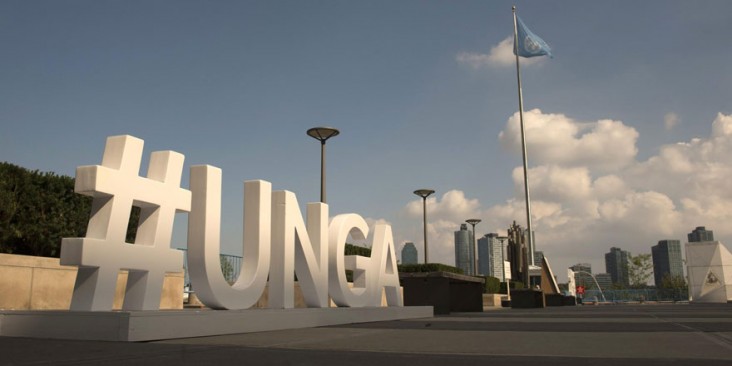- What We Do
- Agriculture and Food Security
- Democracy, Human Rights and Governance
- Economic Growth and Trade
- Education
- Ending Extreme Poverty
- Environment and Global Climate Change
- Gender Equality and Women's Empowerment
- Global Health
- Water and Sanitation
- Working in Crises and Conflict
- U.S. Global Development Lab

A major announcement happened this week at the 72nd UN General Assembly, signaling a transformation in access to a better, safer and cheaper HIV treatment. On Thursday, September 21, a breakthrough pricing agreement between multiple global partners was announced. This agreement will accelerate the availability of the first affordable, generic, single-pill HIV treatment regimen containing dolutegravir (DTG) to public sector purchasers in low- and middle-income countries (LMICs), where much of the global HIV/AIDS epidemic is concentrated.
The pricing agreement was forged by a multiparty partnership consisting of the governments of South Africa and Kenya, together with the Joint United Nations Programme on HIV/AIDS (UNAIDS), the Clinton Health Access Initiative (CHAI), the Bill & Melinda Gates Foundation, the U.S. President’s Emergency Plan for AIDS Relief (PEPFAR), the U.S. Agency for International Development (USAID), the Global Fund to Fight AIDS, Tuberculosis and Malaria, the World Health Organization (WHO), the United Kingdom’s Department for International Development (DFID), with Mylan Laboratories Limited and Aurobindo Pharma. It marks an important step toward ensuring the availability of global, high-quality treatment for HIV.
This revolutionary treatment – a single pill, once-a-day, generic, fixed-dose combination of tenofovir disoproxil fumarate, lamivudine and dolutegravir (TLD) – was developed by Mylan and Aurobindo through licensing agreements with the Medicines Patent Pool. The original developer of DTG, ViiV Healthcare, granted the Medicines Patent Pool licenses for DTG’s generic manufacture in 2014 to support its increased access in LMICs. Mylan and Aurobindo both recently received tentative approval from the U.S. Food and Drug Administration (FDA) for their products procured under PEPFAR. Clinical trials have demonstrated that treatment regimens that use DTG result in more rapid suppression of viral load, fewer side effects, and greater potency against drug resistance than current regimens used in LMICs.
As part of PEPFAR’s engagement on the ceiling price agreements, USAID’s Office of HIV/AIDS and the Center for Accelerating Innovation and Impact (CII) provided active support and guidance. As one of the largest global procurers of antiretrovirals (ARVs) and a key coordinator of past ARV regimen transitions, USAID applied technical expertise and lessons learned to inform the TLD ceiling price agreement negotiations, enabling the Agency to seamlessly integrate this new HIV treatment regimen with current procurement practices. Having learned from past challenges with ensuring a sufficient supply of new ARVs, USAID worked with the other partners to embed rigorous supply and production capacity commitments into the agreements. Through activities like Project OPTIMIZE (a global partnership to accelerate access to simpler, safer and more affordable HIV treatment) and global health supply chain efforts, USAID and its implementing partners are supporting national HIV control and treatment programs through the multifaceted approaches required to transition to TLD regimens at the country level.
USAID is currently supporting ongoing clinical trials and market shaping activities in order to ensure accelerated access to the optimized HIV treatment, TLD, across countries where the Agency works to control the HIV epidemic. These efforts are expected to result in multiple returns, generating significant cost savings for HIV drug procurement, simplifying service delivery for HIV programs, and perhaps most importantly, providing a better treatment experience for HIV patients, which is critical to ensuring treatment adherence and ultimately, epidemic control.
Learn More
- 72nd UN General Assembly
- Accelerating Access to Simpler, Safer, and More Affordable HIV Treatment Through ART Optimization [PDF, 2.3MB]
- New Study Seeks to Accelerate Access to Simpler, Safer and More Affordable HIV Treatment
- Center for Accelerating Innovation and Impact (CII)’s Market Shaping Primer







Comment
Make a general inquiry or suggest an improvement.